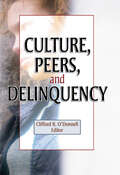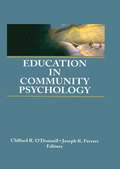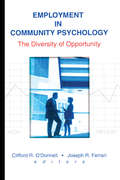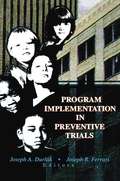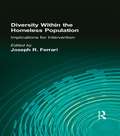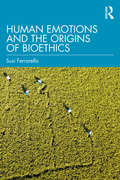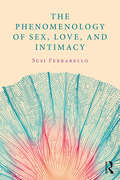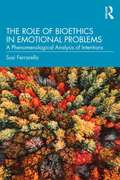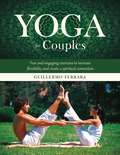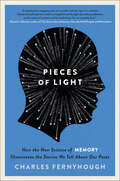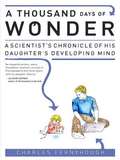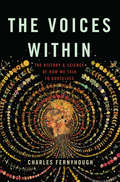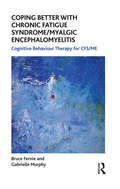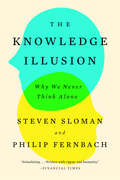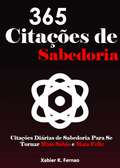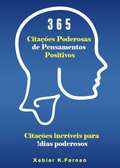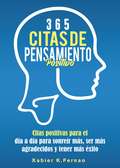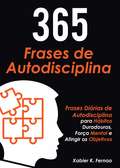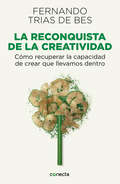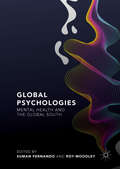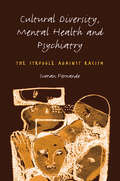- Table View
- List View
Culture, Peers, and Delinquency
by Joseph R Ferrari Clifford R O'DonnellIncrease your understanding of the etiology, prevention, and treatment of delinquency! This informative book provides you with specific strategies to assess delinquency and to increase the effectiveness of any prevention program. In addition, it presents a community peer model of delinquency with important implications for delinquency prevention programs and for delinquency research. Examining specific cultural groups in the United States, including Caucasians, East Asians, South-East Asians, Polynesians/Micronesians, and Vietnamese, as well as Japanese youths in their homeland, this model shows how families, schools, and neighborhoods affect the formation of peer groups-and how these groups can facilitate or inhibit delinquency. Culture, Peers, and Delinquency explores the interplay of historical, traditional culture with contemporary youth culture. It also examines the relationship between individual outcome and community disorganization and illustrates how peer relationships are conditioned by gender. The book will increase your understanding of the etiology, prevention, and treatment of delinquency with examples that show treatment alternatives and outcomes, focusing on: intercultural differences in major descriptors of the attitudes and activities of youth the demographics, economics, and history, as well as a fascinating and disturbing cultural analysis of the ever-increasing rate of juvenile delinquency in Japan the influence of peers and culture on Vietnamese youth gangs in Honolulu gender-difference studies of mixed-culture incarcerated adolescents-and what these youths have to say about the detention facility where they go to school a careful analysis of homes, schools, and neighborhoods in terms of their dysfunctions and how they increase the likelihood that their youth will spend time with similar peers and without adult supervision
Education in Community Psychology: Models for Graduate and Undergraduate Programs
by Joseph R Ferrari Clifford R O'DonnellA useful guide on education in the field of community research and action, Education in Community Psychology explores curriculum issues regarding coursework, field training, the status of research, and the need for promoting a multidisciplinary perspective. For your easy reference, it gives you a thorough overview of the kinds of undergraduate and graduate courses available and of freestanding and interdisciplinary graduate programs in both North America and New Zealand. For your convenience, it also covers the types of knowledge and skills taught in these courses and programs, the professional roles open to community graduates, how programs can work with community organizations, and the steps and issues you should consider when planning a community psychology course or program. From this book’s helpful pages, you will discover why interdisciplinary programs hold the most promise for innovation in graduate education, as well as the greatest potential for developing community research and action into an interdisciplinary field. If you are interested in setting up a program that helps students develop a ‘systems perspective’in the way they approach problems and issues in the community, Education in Community Psychology will help you get started. To this end, you learn about: the issues and strategies in teaching community psychology to your students practical steps for developing your program how to secure viable field placements for your students how your community psychology program can train psychologists in nontraditional roles suited to address human and social problems the ecology of masters’programs selecting required readings trends in interdisciplinary training using social functions that include faculty, students, and community agencies to develop collaborative working relationships the change in APA guidelinesEducation in Community Psychology provides community psychology professors and graduate students, psychology undergraduates intending to go to graduate school, and educators in human development and social work with a practical overview of the field of community research and action, its values, ethics, theories, and methods. With its sample course outlines, recommendations for faculty planning, and insights on how to develop community psychology programs, you will be able to extend your skills beyond the classroom and into the community, where it counts.
Employment in Community Psychology: The Diversity of Opportunity
by Joseph R Ferrari Clifford R O'DonnellDiscover the first book on employment opportunities in community psychology!Employment in Community Psychology: The Diversity of Opportunity is the first psychology career reference book for undergraduate psychology majors deciding on graduate schools, for graduate students in psychology seeking employment, and for psychology faculty advising their students. This book answers the questions “What can you do with a graduate degree in community psychology?” and “Who employs community psychologists?” Employment in Community Psychology addresses these questions through examples of graduates educated in community psychology and employed in diverse applied, research, and academic settings. In Employment in Community Psychology, you will explore the diversity of community psychology employment opportunities through the stories of current graduate students, community psychologists on their first job, and psychologists who have well-established positions in community research and action. Each experience is told in a story-telling style allowing the reader to grasp a deeper understanding of the employment opportunities that cannot be obtained through abstract description alone. Some of the experiences that highlight opportunities in the field include:working in the Institute for Families in Society at the University of South Carolina as a Research Associate working as a researcher at the Korea Institute of Social Psychiatry to determine how primary prevention and action research can be applied to the promotion of adolescent mental health in Korean society doctoral studies that developed into the first community psychology position focusing on the issues of social justice and reconciliation between Indigenous and non-Indigenous groups in Australian town non-traditional academic positions in psychology working as a social worker for Native non-profit health corporation in Alaska a policy-oriented community psychologist, or a c.p. in the disabilities field entering a second career in community psychology at mid-lifeEmployment in Community Psychology is an essential tool for undergrads and graduate students considering a career in community psychology. The rich palette of community psychology experiences that are laid out for the career researcher and advisor are sure to assist students in deciding what area of community psychology they would like to pursue.
Program Implementation in Preventive Trials
by Joseph R Ferrari Joseph A DurlakProgram Implementation in Preventive Trials shows you how you can take a more active part in program evaluation and how you can direct existing programs toward new horizons of more effective service. In this concise, focused look at community-based psychology and its operative programs, you’ll see how and why community programs should be comprehensively evaluated. You’ll see the importance of understanding how interventions were conducted before making conclusions about a program’s impact, and you’ll discover why there’s an ever-widening gap between what is planned and what actually gets implemented in community-based programs.In short, Program Implementation in Preventive Trials helps you see the increasing need for the assessment of implementation, the “active” side of community psychology. You’ll gain instant understanding as to why there’s a need for constant monitoring of a program’s use, and you’ll find answers to the following questions that continue to plague community psychologists who are interested in implementing programs of change: Does the current personnel follow the implementation program? Will new members to the setting understand and utilize the procedures developed for that setting? Will the procedures be modified such that their utility decreases? Specifically, you’ll read about: how to ensure intervention programs are conducted as planned why implementation data should be collected what protocol compliance is and its role in treatment programs when to be flexible so modifications can be made in program procedures who can enhance program adherence by “buying in” to a multi-change agent approach where cultural sensitivity helps programs be more faithfully adopted and conductedIf you’re a scholar or a student interested in studying the fundamental issue of implementation, you’ll definitely want to see what these professionals have compiled in Program Implementation in Preventive Trials. You’ll find that your program agenda, however beneficial it is now, will only be raised and elevated to a new level of performance by the positive examples and research carefully collected here.
Diversity Within the Homeless Population: Implications for Intervention
by Joseph R FerrariAn important contribution to the understanding of the unique circumstances and needs of the homeless, Diversity Within the Homeless Population examines why more and more women and their children, adolescents, and young adults are ending up on the street. You will learn about unique treatment and community intervention programs, preventive approaches that target those at risk for future homelessness, and case management as a strategy for preventing the initial experience of homelessness. You will also learn about the ”behavioral” factors that differentiate homeless women with children from impoverished women with children who remain housed, including domestic violence, degree of education, number of children, traumatic experiences, and use of drugs. You&’ll find this dynamic book takes a giant step toward the development and evaluation of strategies for preventing and alleviating this urgent social problem. In doing so, Diversity Within the Homeless Population explores the benefits of family-oriented treatment, ways to make housing available to the homeless through employment opportunities, and the effectiveness of linking inpatient treatment to a culturally sensitive, community-based intervention program. You will also learn about: the lack of personal support networks among the homeless crack/cocaine use and homelessness among inner-city communities preventing relapse among crack-using homeless women with children the “Needs Foundation” in Chicago social and environmental predictors of adjustment in homeless children homelessness and how it compromises the behavioral, physical, social, cognitive, and emotional development of children hierarchical multiple regression analyses system and agency demands on case managersAs a researcher, social worker, psychologist, or counselor who works with the homeless, you face extraordinary adversity on a daily basis; this book offers you hope, guidance, insight, and intervention strategies that will aid you in tackling this enormous social problem. Diversity Within the Homeless Population provides you with a storehouse of ideas that you’ll implement in your own practice or community.
Human Emotions and the Origins of Bioethics
by Susi FerrarelloThis book provides a unique phenomenological dialogue between psychology and philosophy on the origin of bioethics that shows the importance of bringing emotions into bioethical discourse. Divided into two parts, the book begins by defining bioethics and explaining the importance of emotions in making us human, allowing us to consider life holistically. Ferrarello argues that emotions and bioethics are better served when they are combined, and that dismissing emotions as nothing more than a nuisance to our rationality has created a society that does not fit our human nature. Chapters explore how ethics relate to intimate life and how ethical agents determine themselves within their surrounding world, uniquely and interrogatively using ‘bioethics’ to consider not only medical dilemmas but also issues concerning environmental and individual well-being. By addressing personal, interpersonal, and societal problems as dynamically interconnected in bioethical problems she helps us to renew our sense of responsibility toward a good quality of life. This interdisciplinary book is invaluable reading for students of health science, psychology, and philosophy, as well as for those interested in the link between emotions and bioethical discourse from both a psychological and philosophical perspective.
The Phenomenology of Sex, Love, and Intimacy
by Susi FerrarelloThe Phenomenology of Sex, Love, and Intimacy presents a phenomenological exploration of love as it manifests itself through sexual desires and intimate relationships. Setting up a unique dialogue between psychology and philosophy, Susi Ferrarello offers a perspective through which clinicians can inform their practice on diverse issues of human sexuality. Drawing on Husserl’s phenomenology, Ferrarello’s analysis of love spans a range of disciplines including psychology, theology, biology, epistemology, and axiology, as well as areas related to gender, consent, and political control. Combining Husserlian perspectives on ethics with a focus on lived-experience, this text will deepen therapists’ understanding of love as the subject of interdisciplinary inquiry and enable them to locate questions of sexuality and intimacy within an academic framework. With key theoretical principles included to allow clinicians to think through and clarify their practice, this book will be a valuable tool for sex therapists, marriage and family therapists, and counselors, as well as psychology and philosophy students alike.
The Role of Bioethics in Emotional Problems: A Phenomenological Analysis of Intentions
by Susi FerrarelloFollowing up from the previous book, Human Emotions and the Origins of Bioethics, thisvolume focuses on four psychological problems, anxiety, narcissism, restlessness,and emotional numbness, and explores how these problems influence bioethical issues and what bioethics can do to fix them. The Role of Bioethics in Emotional Problems presents a phenomenological exploration ofemotional intention and describes how one’s choices can determine a better relationship tothemselves and their community. Not only does this book provide the reader with an exhaustive account of the philosophical and psychological meaning of practical intentionality within Husserl’s phenomenology, but it also applies Husserl’s ethics to contemporary studies of human emotions and bioethical problems. Offering a non-reductionist model for an interdisciplinary inquiry into an emotional experience, it integrates clinical practice and articulates foundational knowledge of human emotional life at a professional level. Aimed at students of philosophy, psychology, psychotherapy, and bioethics, this book is a unique phenomenological dialogue between these disciplines on emotional well-being.
Yoga for Couples: Fun and Engaging Exercises to Increase Flexibility and Create a Spiritual Connection
by Guillermo FerraraIn addition to increasing your flexibility, harmony, and spiritual balance, Yoga for Couples helps by narrowing the bonds that tie us together. This activity encompasses a combination of techniques and exercises that invigorate the body, pacify the mind, and elevate the spirit. This revolutionary book by Guillermo Ferrara presents a kind of yoga that is dynamic, youthful, and current, one that you can practice with whomever you want, regardless of any romantic connection. The exercises and advice in this guide are a gift for the muscles, organs, and skin, serving as a refuge of vital energy. It contains: * Yoga for couples poses * Exercises to increase flexibility * Yoga-style cooking ideas to share * Yoga and dancing moves * Details on the philosophy of yoga * Insight on meditation for two * Information on sacred spaces * Advice on breathing and increasing energy
Pieces of Light: How the New Science of Memory Illuminates the Stories We Tell About Our Pasts
by Charles FernyhoughShort-listed for the Royal Society Winton Prize for Science Books, the Best Book of Ideas Prize, and the Society of Biology Book Awards • Book of the Year: Sunday Times, Sunday Express, and New Scientist“In its stunning blend of the literary with the scientific, Pieces of Light illuminates ordinary and extraordinary stories to remind us that who we are now has everything to do with who we were once, and that identity itself is intricately rooted the transporting moments of remembrance. We are what we remember.” — André Aciman, author of Out of Egypt and Harvard SquareA new consensus is emerging among cognitive scientists: rather than possessing fixed, unchanging memories, we create new recollections each time we are called upon to remember. As psychologist Charles Fernyhough explains, remembering is an act of narrative imagination as much as it is the product of a neurological process. In Pieces of Light, he illuminates this compelling scientific breakthrough in a series of personal stories, each illustrating memory's complex synergy of cognitive and neurological functions.Combining science and literature, the ordinary and the extraordinary, this fascinating tour through the new science of autobiographical memory helps us better understand the ways we remember—and the ways we forget.
A Thousand Days of Wonder
by Charles FernyhoughA father's intimate look at his daughter's developing mind from birth to age three Unlike any other time in our lives, we remember almost nothing from our first three years. As infants, not only are we like the proverbial blank slate but our memories are like teflon: nothing sticks. In this beautifully written account of his daughter's first three years, Charles Fernyhough combines his vivid observations with a synthesis of developmental theory, re-creating what that time, lost to the memory of adults, is like from a child's perspective. In A Thousand Days of Wonder, Fernyhough, a psychologist and novelist, attempts to get inside his daughter's head as she acquires all the faculties that make us human, including social skills, language, morality, and a sense of self. Written with a father's tenderness and a novelist's empathy and style, this unique book taps into a parent's wonder at the processes of psychological development.
The Voices Within: The History and Science of How We Talk to Ourselves
by Charles FernyhoughA luminous exploration of the nature of thoughts, from daydreams to the voices in our headsAt the moment you caught sight of this book, what were you thinking? Was your thought a stream of sensations? Or was it a voice in your head? Did you ask yourself, "I wonder what that's about?" Did you answer? And what does it mean if you did?When someone says they hear voices in their head, they are often thought to be mentally ill. But, as Charles Fernyhough argues in The Voices Within, such voices are better understood as one of the chief hallmarks of human thought. Our inner voices can be self-assured, funny, profound, hesitant, or mean; they can appear in different accents and even in sign language. We all hear them-and we needn't fear them. Indeed, we cannot live without them: we need them, whether to make decisions or to bring a book's characters to life as we read. Studying them can enrich our understanding of ourselves, and our understanding of the world around us; it can help us understand the experiences of visionary saints, who might otherwise be dismissed as schizophrenics; to alleviate the suffering of those who do have mental health problems; and to understand why the person next to us on the subway just burst out laughing for no apparent reason.Whether the voices in our heads are meandering lazily or clashing chaotically, they deserve to be heard. Bustling with insights from literature, film, art, and psychology, The Voices Within offers more than science; it powerfully entreats us all to take some time to hear ourselves think.
Coping Better With Chronic Fatigue Syndrome/Myalgic Encephalomyelitis: Cognitive Behaviour Therapy for CFS/ME (The Self-Help Series)
by Bruce Fernie Gabrielle MurphyThis book provides a helpful structure and framework for understanding Chronic Fatigue Syndrome/Myalgic Encephalomyelitis (CFS/ME) and its effects as well as practical exercises to help address some of the symptoms that patients may experience.
The Knowledge Illusion: Why We Never Think Alone
by Philip Fernbach Steven Sloman“The Knowledge Illusion is filled with insights on how we should deal with our individual ignorance and collective wisdom.” —Steven PinkerWe all think we know more than we actually do. Humans have built hugely complex societies and technologies, but most of us don’t even know how a pen or a toilet works. How have we achieved so much despite understanding so little? Cognitive scientists Steven Sloman and Philip Fernbach argue that we survive and thrive despite our mental shortcomings because we live in a rich community of knowledge. The key to our intelligence lies in the people and things around us. We’re constantly drawing on information and expertise stored outside our heads: in our bodies, our environment, our possessions, and the community with which we interact—and usually we don’t even realize we’re doing it. The human mind is both brilliant and pathetic. We have mastered fire, created democratic institutions, stood on the moon, and sequenced our genome. And yet each of us is error prone, sometimes irrational, and often ignorant. The fundamentally communal nature of intelligence and knowledge explains why we often assume we know more than we really do, why political opinions and false beliefs are so hard to change, and why individually oriented approaches to education and management frequently fail. But our collaborative minds also enable us to do amazing things. This book contends that true genius can be found in the ways we create intelligence using the world around us.
365 Citações de Sabedoria: Citações Diárias de Sabedoria Para Se Tornar Mais Sábio e Mais Feliz
by Xabier K. FernaoVocê preferiria aprender 30 anos de lições com as vidas de outras pessoas, ou viver 30 anos para aprender estas lições? Pense nisto. O que estou essencialmente perguntando é... Por que não aprender com as falhas, sucessos e experiências de vida de outras pessoas? Foi Sócrates, um dos maiores filósofos gregos que disse... “A verdadeira sabedoria chega para cada um de nós quando percebemos o quão pouco entendemos sobre a vida, sobre nós mesmos e sobre o mundo ao nosso redor." Não é verdade que não precisamos ler um livro imenso com muitos jargões e termos técnicos para se tornar mais sábio, mais consciente e ter mais paz? É por isto que este livro de 365 Citações de Sabedoria é tão importante.
365 Citações Poderosas de Pensamentos Positivos: Citações incríveis para dias poderosos!
by Xabier K. FernaoVocê não está cansado de toda a negatividade que o rodeia em seu ambiente? As notícias, a mídia televisiva, a mídia social, seus amigos, sua família, seus parentes e a lista interminável continua.... Os céticos podem dizer que a positividade é chique. Contudo podemos dizer que os céticos são também conhecidos como pessoas negativas. Pense nisso ... eu vou te dar um exemplo ...Digamos que você planeja se tornar um milionário um dia ou talvez até um bilionário. Você começa a procurar mentores para ensiná-lo e guiá-lo. Você acha que o milionário ou bilionário autodidata lhe diria que é impossível e que é uma ideia fantasiosa? Ou você acha que são aqueles que são pobres e miseráveis (geralmente ... nossos amigos e familiares) que tentam nos parar? Espero que você não fiqueofendido. Se estiver, pare de ler. Este livro não é para os fracos. Não é para os que facilmente se ofendem. É para os humildes e famintos que querem mais, buscam mais e trabalham por mais. Nas 365 citações de pensamento positivo, você será exposto a algumas das citações mais inspiradoras e poderosas que podem mudar o curso de sua vida. Talvez uma citação que você leia nos próximos 365 dias desencadeie um grande evento que aconteceu em sua vida. Talvez isso possa lembrá-lo das dificuldades que você chegou até aqui. Talvez lhe dê a permissão para se lembrar de que você é um presente e que hoje é precioso e não importa o que aconteça, lembre-se de que a vida acontece para você e não para você.
365 citas de pensamiento positivo: Citas positivas para el día a día para sonreír más, ser más agradecidos y tener más éxito
by Xabier K. Fernao¿No estás harto de toda la negatividad que te rodea en tu entorno? Las noticias, los medios de comunicación, las redes sociales, tus amigos, tu familia y la lista interminable continúa. Los escépticos podrían decir que la positividad es elegante. Los escépticos son conocidos como personas negativas. Piénsalo... Te daré un ejemplo... Digamos que esperas convertirte en millonario algún día o incluso en multimillonario. Comienzas a buscar mentores para que te enseñen y te guíen. ¿Crees que el millonario o multimillonario hecho a sí mismo te diría que es imposible y que tu idea es una pura fantasía? ¿O crees que son los que son pobres y miserables (generalmente... nuestros amigos y familiares) los que intentan detenernos? Espero que no te ofendas. Si es así, deja de leer. Este libro no es para los débiles. No es para los que se ofenden fácilmente. Es para los humildes y ambiciosos que quieren más, buscan más y trabajan por más. En 365 citas de pensamiento positivo, estarás expuesto a algunas de las citas más inspiradoras y poderosas que podrían cambiar el curso de tu vida. Tal vez una de las citas que leerás en los próximos 365 días desencadenará un evento importante en tu vida. Tal vez podría recordarte las dificultades que has tenido para llegar tan lejos. Tal vez te dé permiso para recordarte que eres un regalo y que el día de hoy es precioso y no importa lo que pase, recuerdas que la vida te sucede debido a ti y no a ti.
365 Citaten van Wijsheid: Dagelijkse citaten van wijsheid om wijzer en gelukkiger te worden
by Xabier K. FernaoSchokkende statistieken: Een Gemiddelde Amerikaan Leest 1 Boek per Jaar en 50% daarvan zijn Romantische Romans.... Kijk, ik weet niet wie je bent, maar ik weet zeker dat je nu deze pagina leest, omdat je iemand bent die meer wil. Je bent iemand die geen genoegen neemt met het gemiddelde. Zie je, ik begrijp de wens om te willen leren maar tegelijkertijd op te zien tegen het lezen van een lijvig en dik boek! Daarom hebben we dit boek gemaakt.... Meer over dit boek: Zou je liever een les leren dank zij de 30 jaar levenservaring van anderen of 30 jaar leven om diezelfde les te leren? Denk daar eens over na. Wat ik je eigenlijk vraag is… waarom niet leren van de mislukkingen, successen en levenservaringen van andere mensen? Het was Socrates, een van de grootste Griekse filosofen die zei dat… "Echte Wijsheid Komt tot Ieder van Ons Wanneer We Beseffen Hoe Weinig We Begrijpen van het Leven, Onszelf en de Wereld om ons Heen". Het is toch zo, dat we echt geen lijvig boek vol met jargon en techniciteiten moeten lezen om wijzer, bewuster en vredelievender te worden? Dat is waarom dit 365 Citaten van Wijsheid boek zo belangrijk is. Dat is het mooie van Citaten. Kort, Simpel en Krachtig. Ik hoop en vertrouw er op dat je deze echt korte introductie tot dit boek wel fijn vond. Lees de citaten, gebruik ze, doe er gretig beroep op en maak ze tot je vrienden. Reageer nu door te klikken op de "Koop nu in 1-klik" knop bovenaan deze pagina! P.S. Hier is nog een andere schokkende statistiek: "50% van de Amerikaanse volwassenen kan geen boek lezen dat geschreven is op het niveau van de lagere humaniora.". P.P.S. Ik weet absoluut dat deze statistieken niet op jou van toepassing zijn. Reageer Nu door te Klikken op de "Koop nu in 1-klik" knop bovenaan deze pagina!
365 Frases de Autodisciplina: Frases Diárias de Autodisciplina para Hábitos Duradouros, Força Mental e Atingir os Objetivos
by Xabier K. Fernao“Somos aquilo que fazemos repetidamente. A Excelência não é um ato, mas sim um hábito” – Aristóteles Qual é o fator delimitador #1 entre pobres e ricos, os bem-sucedidos e os fracassados, as pessoas felizes e infelizes? Autodisciplina. Pense nisso. Quando não é disciplinado em relação ao seu trabalho/emprego, acumula trabalho e eventualmente enerva-se e fica esgotado. Quando não é disciplinado com as suas finanças, irá acumular despesas e dívidas desnecessárias e irá eventualmente enervar-se e ficar esgotado a nível económico. Já percebeu a ideia. Contudo, o que se passa com o livro “365 Dias de Frases de Autodisciplina”? Concorda que a mentalidade é 80%, e as estratégias e mecânicas são apenas 20% no que toca a atingir o sucesso? Já entendeu a ideia geral. As pessoas estão sempre a perseguir os 20%, as coisas vistosas, e pensam que UMA boa ideia vai discipliná-las. São, contudo, todos os lembretes diários, influência e ambiente que fazem com que as pessoas se disciplinem e comprometam todos os dias. Não sei o que está a tentar alcançar. Talvez seja o seu corpo de sonho, ter aqueles abdominais que sempre quis. Talvez seja uma inovação no seu negócio, acrescentando mais um zero no final do rendimento anual deste ano. Não importa. Aquilo que sei sobre si, ainda assim, é que é alguém que quer mais. E isso já é espetacular. Quer mais dinheiro, mais saúde, mais felicidade, mais sexo, mais prazer, mais conhecimento e mais liberdade… e não existe nada de errado com isso. A vida é sobre crescer e expandir o nosso ‘eu’. Ou crescemos um pouco a cada dia ou morremos um pouco a cada dia. Expresso-lhe o meu mais profundo respeito por querer escolher o caminho ascendente, o caminho do crescimento e da autodisciplina.
730 Citas de Hombre Alfa: Citas de Hombres y Estado Físico para el Empoderamiento Personal, la Confianza en sí mismo y el Éxito Personal
by Xabier K. FernaoXabier K. Fernao es un firme creyente de que las citas son una de las cosas más hermosas y sabias que se han creado. Piénsalo. Puedes leer todo el libro grueso y grueso. En busca de conocimiento, será más probable que el bombardeo con un aluvión de confusión. Todos están diciendo qué pensar y cómo pensar. La belleza de las citas es la cita en el espacio para la exploración. Cada cita no tiene ningún significado, excepto la que le das. No hay contexto, excepto el lector (Tú).
Selbstdisziplin in 365 Zitaten: Zitate für jeden Tag – ändere deine Gewohnheiten, stärke deinen Geist, erreiche deine Ziele
by Xabier K. Fernao„Wir sind, was wir immer wieder tun. Vorzüglichkeit ist daher keine Handlung, sondern eine Gewohnheit.“ – Aristoteles Was ist der wichtigste Faktor, der zwischen Armen und Reichen, Erfolgreichen und Erfolglosen, Glücklichen und Unglücklichen unterscheidet? Selbstdisziplin. Denk mal darüber nach. Wenn du disziplinlos im Beruf bist, häuft sich bald die Arbeit auf, und am Ende bist du gestresst und ausgebrannt. Wenn du disziplinlos mit deinem Geld umgehst, häufst du unnötige Kosten und Schulden auf und bist am Ende finanziell gestresst und ausgebrannt. Du siehst, worauf ich hinauswill. Aber wieso ein Buch mit „Selbstdisziplin in 365 Zitaten“? Stimmst du mir zu, dass Erfolg zu 80% von der Einstellung und nur zu 20% von Strategien und Mechanismen abhängt? Du siehst, worauf ich hinauswill. Die Leute jagen immer den 20% nach, den unrealistischen Dingen, und denken, dass die EINE große Idee sie zu disziplinierten Menschen machen wird. Aber so ist es nicht. Es sind die täglichen Impulse, Eingebungen und nicht zuletzt das Umfeld, die einen jeden Tag aufs Neue zur Disziplin motivieren. Ich weiß nicht, was du dir vorgenommen hast. Vielleicht ist es deine Traumfigur, der Waschbrettbauch, den du immer schon haben wolltest. Vielleicht ist es dein beruflicher Durchbruch, eine Null mehr hinter dem Jahreseinkommen. Es ist auch egal. Was ich aber über dich weiß: du bist jemand, der mehr will. Und das ist ziemlich großartig. Du willst mehr Geld, mehr Gesundheit, mehr Glück, mehr Sex, mehr Lebensfreude, mehr Wissen und mehr Freiheit… und daran ist absolut nichts verkehrt. Im Leben geht es darum, zu wachsen und sich weiterzuentwickeln. Wir können entweder jeden Tag ein bisschen wachsen oder jeden Tag ein bisschen sterben. Ich finde es unglaublich bewundernswert, dass du den Weg bergauf gewählt hast, den Weg des Wachstums und der Selbstdiszip
La reconquista de la creatividad: Cómo recuperar la capacidad de crear que llevamos dentro
by Fernando Trias de BesLa creatividad no tiene final, no conoce más límite que el que la propia vida le imponga. Cuando se acabe la vida, la creatividad lo hará con ella. Mientras haya vida, la creatividad permanecerá. Y eso, como seres vivos e inteligentes que somos, es una gran noticia.Fernando Trías de BesLa creatividad es una facultad innata a la condición humana. Este es el punto de partida de la reflexión de Fernando Trías de Bes en La reconquista de la creatividad. El acto de crear es consustancial a nuestra existencia. Sin embargo, a medida que nuestras vidas avanzan vamos progresivamente perdiendo el impulso de esta facultad. El miedo al error, el imperio de la lógica, el sistema educativo o los protocolos y rutinas producen individuos eficientes y adaptados pero se convierten en algunas de las circunstancias que van limitando de forma progresiva nuestra capacidad de crear. La buena noticia es que la facultad creativa permanece latente en nuestro interior y es recuperable. Fernando Trías de Bes nos ofrece una serie de herramientas prácticas para reconquistar nuestra capacidad de crear, tanto a través de la identificación y erradicación de los obstáculos e inhibidores del proceso creativo como de una serie de potenciadores de la creatividad.
Global Psychologies: Mental Health and the Global South
by Suman Fernando Roy MoodleyThis book critiques our reliance on Eurocentric knowledge in the education and training of psychology and psychiatry. Chapters explore the diversity of ‘constructions of the self’ in non-Western cultures, examining traditional psychologies from Africa, Asia, Australasia, and Pre-Columbian America. The authors discuss liberation psychologies and contemporary movements in healing and psychological therapy that draw on both Western and non-Western sources of knowledge. A central theme confronted is the importance, in a rapidly shrinking world, for knowledge systems derived from diverse cultures to be explored and disseminated equally. The authors contend that for this to happen, academia as a whole must lead in promoting cross-national and cross-cultural understanding that is free of colonial misconceptions and prejudices. This unique collection will be of value to all levels of study and practice across psychology and psychiatry and to anyone interested in looking beyond Western definitions and understandings.
Mental Health in a Multi-Ethnic Society: A Multidisciplinary Handbook
by Suman Fernando Frank KeatingThis new edition of Mental Health in a Multi-Ethnic Society is an authoritative, comprehensive guide on issues around race, culture and mental health service provision. It has been updated to reflect the changes in the UK over the last ten years and features entirely new chapters by over twenty authors, expanding the range of topics by including issues of particular concern for women, family therapy, and mental health of refugees and asylum seekers. Divided into four sections the book covers: issues around mental health service provision for black and minority ethnic (BME) communities including refugees and asylum seekers critical accounts of how these issues may be confronted, with examples of projects that attempt to do just that programs and innovative services that appear to meet some of the needs of BME communities a critical but constructive account of lessons to be drawn from earlier sections and discussion of the way ahead. With chapters on training, service user involvement, policy development and service provision Mental Health in a Multi-Ethnic Society will appeal to academics, professionals, trainers and managers, as well as providing up-to-date information for a general readership.
Cultural Diversity, Mental Health and Psychiatry: The Struggle Against Racism
by Suman Fernando Dr Suman Fernando'Black and minority ethnic communities lack confidence in mental health services', according to the National Service Framework for Mental Health published by the Department of Health in 1999. Cultural Diversity, Mental Health and Psychiatry examines how and why this situation has come about, and makes specific practical, often surprising, suggestions for changing the status quo. In his latest and most critical analysis, Suman Fernando reflects on the current situation in light of his own personal experience, academic research and anecdotal reports. He weaves together themes of immense importance for the future of psychiatry and mental health services in a multi-cultural setting, exploring:* the nature of racism and its permeation into mental health services * the inside story of the struggle against racism in statutory and voluntary sectors of the mental health system* the history of psychiatry and the role of spirituality, holistic thinking, psychotherapy and Asian traditions of medicine. Trainees, practitioners, and managers of mental health services will profit from the practical application of Fernando's latest ideas, and students and academics will benefit from his theoretical guidance.
